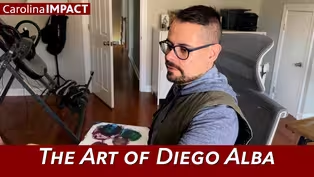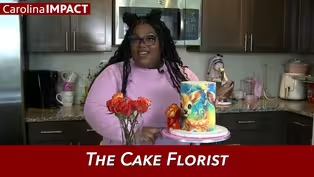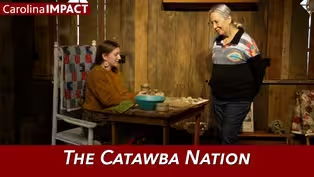
The History of Black Cuisine | Carolina Impact
Clip: Season 12 Episode 1214 | 5m 31sVideo has Closed Captions
Meet a man interpreting the life of an enslaved cook and sparking conversations with food.
Meet a man interpreting the life of an enslaved cook and sparking conversations though food. Dontavius Williams portrays "Adam" through his "Chronicles of Adam" presentation at historic sites across the South East. Williams uses his love of history and passion for cooking to share the influence of African Americans on the food we eat. The History of Black Cuisine, only on Carolina Impact.
Problems playing video? | Closed Captioning Feedback
Problems playing video? | Closed Captioning Feedback
Carolina Impact is a local public television program presented by PBS Charlotte

The History of Black Cuisine | Carolina Impact
Clip: Season 12 Episode 1214 | 5m 31sVideo has Closed Captions
Meet a man interpreting the life of an enslaved cook and sparking conversations though food. Dontavius Williams portrays "Adam" through his "Chronicles of Adam" presentation at historic sites across the South East. Williams uses his love of history and passion for cooking to share the influence of African Americans on the food we eat. The History of Black Cuisine, only on Carolina Impact.
Problems playing video? | Closed Captioning Feedback
How to Watch Carolina Impact
Carolina Impact is available to stream on pbs.org and the free PBS App, available on iPhone, Apple TV, Android TV, Android smartphones, Amazon Fire TV, Amazon Fire Tablet, Roku, Samsung Smart TV, and Vizio.

Introducing PBS Charlotte Passport
Now you can stream more of your favorite PBS shows including Masterpiece, NOVA, Nature, Great British Baking Show and many more — online and in the PBS Video app.Providing Support for PBS.org
Learn Moreabout PBS online sponsorship(gentle music) - [Jason] When the first enslaved Africans stepped on the shores at Jamestown, Virginia in 1619, the first words in a dark chapter of American history were inked.
For centuries, their contributions to the development of the nation were overlooked and marginalized.
But more than 400 years since Jamestown, interpreters like Dontavius Williams now work hard highlighting and celebrating those early contributions.
On a Saturday morning in Pineville, Williams preps a fire and all the ingredients for a cooking demonstration in a log cabin at the James K. Polk state historic site.
- [Dontavius] We are making a peanut sauce.
- [Jason] Wearing period correct attire and using cooking methods of the era.
- [Dontavius] The hearth cooking is the way to go.
- [Jason] It might look like your typical 18th-century cooking demo, but this is something different.
This is the chronicles of Adam and William's interpretation of an enslaved cook.
Williams says, working in the kitchen was one of the most stressful jobs on a plantation.
Those with wealth and power often entertained as a symbol of status.
- One would believe that it was a fortunate job to be in the kitchen.
I would disagree, because in the kitchen you're under constant scrutiny by the mistress of the house.
If you are living as a higher class individual, say for instance like George Washington or the Lee family or anybody in Colonial Virginia, you have a point to prove, right.
And you don't want to serve people just anything.
So the cook's job is always, always under constant scrutiny.
Those who were enslaved in the low country, a lot of the times-- - [Jason] During his program, Williams gives insight into the diets of the enslaved.
- The enslaved were given rations of cornmeal and salt pork, or depending on where they are, maybe dried fish.
And sometimes they were given the opportunity to be able to grow small garden spaces.
- [Jason] But from these basic ingredients, the seeds were planted for new culinary traditions.
- Things like cow peas, black eyed peas, peanuts were all considered not fit for human consumption, but those colonists fed these things to enslaved Africans.
But one day, I believe somebody went over into the slave quarters and they smelled some beautiful aroma, and they tasted what was in the pot and realized that, you know this food, I didn't die from it, right.
And because I didn't die from it, it also is really tasty.
(food frying) Cultural diffusion happens in so many different ways, in ways that we don't even realize that we are picking up other cultures.
To have the magic answer of how the African cuisine made it into the making of America.
I really can't tell you other than my theory that somebody tasted the pot.
The rest is history, if you will.
- [Jason] Speaking of cultural diffusion, according to Williams, one classic and very popular Creole dish is a trifecta of African, Native American and European cuisines.
- Gumbo ain't gumbo unless you got gumbo in it.
If it doesn't have gumbo in it, it's just soup.
Gumbo is an okra soup.
The okra serves as a thickener.
It all goes back to a lot of the ways of Africa.
- [Jason] Now, if you're wondering what he's cooking here, you have to start with a star ingredient, the peanut.
- The conversation today is about the peanut and about those vegetables and things that were indigenous to the African diaspora.
- [Jason] And with the peanut, he's making a sauce that's similar to a peanut soup.
- Always tease with Virginians that they think they invented peanut soup, because peanut soup is one of those big things in Virginia.
But I have to let them know that ground nut stew or ground nut soup is something that is just as much African, if not more as it is Virginian.
(gentle music) - [Jason] By immersing himself in 18th-century conditions, Williams connects with his ancestors, but with his food, he's creating a space for conversation in the 21st century.
- I don't just cook, but I cook and I discuss a very difficult topic.
And that topic is that of slavery and the making of America.
Food is that magic secret that brings people in from all over the place to be able to have those difficult conversations.
And they later find out that it's really not that difficult of a conversation, because we're simply talking about people and who they were and where they were in life at a particular time.
Food is the thing that brings us together, but at the same time, it could divide us greatly.
If we use it right, we can be able to solve a lot of the world's problems over a simple pot of soup.
(gentle music) Ain't no food like America food, you know what I'm saying?
Everything kind of just comes together so neatly.
But you can actually look at table and see the world.
There's so many things that could divide us, but when you look at our tables every single day or look at the cuisine that we have every single day, the food brings us together.
- [Jason] So perhaps take a moment and consider the origin and culture behind the nourishing food you consume on a daily basis.
You may never look at food the same way again.
For Caroline Impact, I'm Jason Terzis reporting.
The Art of Diego Alba | Carolina Impact
Video has Closed Captions
Clip: S12 Ep1214 | 5m 54s | Follow the journey of artist Diego Alba and how his experiences shaped his art. (5m 54s)
The Cake Florist | Carolina Impact
Video has Closed Captions
Clip: S12 Ep1214 | 6m 23s | The Cake Florist creates works of art, using cakes and floral arrangements. (6m 23s)
The Catawba Nation | Carolina Impact
Video has Closed Captions
Clip: S12 Ep1214 | 5m 9s | See how generations of Catawba Indians keep their traditions alive. (5m 9s)
February 11th, 2025 | Carolina Impact
Preview: S12 Ep1214 | 30s | The Catawba Nation, The History of Black Cuisine, The Art of Diego Alba, & The Cake Florist. (30s)
Providing Support for PBS.org
Learn Moreabout PBS online sponsorship
- News and Public Affairs

Top journalists deliver compelling original analysis of the hour's headlines.

- News and Public Affairs

FRONTLINE is investigative journalism that questions, explains and changes our world.












Support for PBS provided by:
Carolina Impact is a local public television program presented by PBS Charlotte



